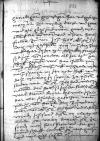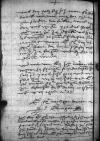Ich hab E(wer) G(nade) in lang nÿt geschribe(n), pein(n) ouch stecz hem(m) und her in Charles V of Habsburg (*1500 – †1558), ruler of the Burgundian territories (1506-1555), King of Spain as Charles I (1516-1556), King of Naples and Sicily, King of the Romans (1519-1530), Holy Roman Emperor of the German Nation (elected 1519, crowned 1530, abdicated 1556); son of Philip I the Handsome and Joanna the Mad of Castile⌊ier m(aieste)tCharles V of Habsburg (*1500 – †1558), ruler of the Burgundian territories (1506-1555), King of Spain as Charles I (1516-1556), King of Naples and Sicily, King of the Romans (1519-1530), Holy Roman Emperor of the German Nation (elected 1519, crowned 1530, abdicated 1556); son of Philip I the Handsome and Joanna the Mad of Castile⌋ geschefften geraÿst, sÿd ich vo(n) Geneva (Genf, Gebenna, Genava), city in Switzerland⌊IenowaGeneva (Genf, Gebenna, Genava), city in Switzerland⌋, als ier m(aieste)t ze schÿff gesesse(n), was her chome(n) pein(n) und v(er)siech mÿch uff Mÿchaele[1] wÿder nach Spain (Hispania)⌊SpangaSpain (Hispania)⌋ an ier m(aieste)t hoff, und doch nÿt lang in Spanÿa ze plibe(n), sonder wie E(wer) G(naden) thon hat, vilob ze neme(n). Des halb(en), so ich d(a)s selbst E(wer) G(naden) was diene(n) kuÿnt, das wolt ichals der alt, / schuldig gefather, wie(n) pillich, vo(n) hercze(n) gern thun, undmag nu(m)er vo(n) E(wer) G(naden) geschrib(en) und befolche(n) werd(en). Ichsend dÿsse(n) an Johan Weze (*1490 – †1548), secretary to King Christian II of Denmark; in 1522 nominated Archbishop of Lund; in 1527 was banished from Denmark as Christian II's secretary, and joined the service of Emperor Charles V as his diplomat, 1537-1548 Bishop of Constance (WHALEY, p. 314)⌊elect(us) vo(n) LundaJohan Weze (*1490 – †1548), secretary to King Christian II of Denmark; in 1522 nominated Archbishop of Lund; in 1527 was banished from Denmark as Christian II's secretary, and joined the service of Emperor Charles V as his diplomat, 1537-1548 Bishop of Constance (WHALEY, p. 314)⌋ gen Vienna (Wien, Vienna), city in eastern Austria, on the Danube river⌊WienVienna (Wien, Vienna), city in eastern Austria, on the Danube river⌋, den E(wer) G(naden) ze send(en). Mein Ursula Meuting daugther of Lucas Meuting, member of the merchant family in Augsburg; from 1530 wife of Ulrich Ehinger (ZELINSKY HANSON, p. 123 and footnote 46; EIRICH, p. 170)⌊haus frowUrsula Meuting daugther of Lucas Meuting, member of the merchant family in Augsburg; from 1530 wife of Ulrich Ehinger (ZELINSKY HANSON, p. 123 and footnote 46; EIRICH, p. 170)⌋ und die gancz frund schafft leud E(wer) G(naden) vast gruetze(n) und vÿl gutzs sage(n) etc.  AAWO, AB, D. 67, f. 233v Umb den pelcz sag ich Euwer G(naden) gross(en) danck, wie wol imer der nÿt wor[...] hidden by binding⌈[...][...] hidden by binding⌉ ÿst, sonder die The Fuggers German family of merchants and bankers that dominated European business during the 15th and 16th centuries⌊FuckerThe Fuggers German family of merchants and bankers that dominated European business during the 15th and 16th centuries⌋ wend nÿcht hidden by binding⌈[t]t hidden by binding⌉ dar umb wÿsse(n). Pyt des halb(en) E(wer) G(naden), imer zu ze schicke(n) und in mein(em) ab wesse(n) mÿne(n) schwecher Lucas Meuting ⌊Lucas MeÿnnigLucas Meuting ⌋, wem E(wer) G(nad)e den uff geb(en) hant, da mÿt ich im wÿsse nach ze frage(n) und d(a)z der nÿt v(er)lore(n) werde.
AAWO, AB, D. 67, f. 233v Umb den pelcz sag ich Euwer G(naden) gross(en) danck, wie wol imer der nÿt wor[...] hidden by binding⌈[...][...] hidden by binding⌉ ÿst, sonder die The Fuggers German family of merchants and bankers that dominated European business during the 15th and 16th centuries⌊FuckerThe Fuggers German family of merchants and bankers that dominated European business during the 15th and 16th centuries⌋ wend nÿcht hidden by binding⌈[t]t hidden by binding⌉ dar umb wÿsse(n). Pyt des halb(en) E(wer) G(naden), imer zu ze schicke(n) und in mein(em) ab wesse(n) mÿne(n) schwecher Lucas Meuting ⌊Lucas MeÿnnigLucas Meuting ⌋, wem E(wer) G(nad)e den uff geb(en) hant, da mÿt ich im wÿsse nach ze frage(n) und d(a)z der nÿt v(er)lore(n) werde.
Und wie vor, kan ich Isabel Delgada (†after 1546-06-15), Dantiscus' paramour during his stay in Spain, mother of his two children, Juana and Juan (Juan died in childhood)⌊mutterIsabel Delgada (†after 1546-06-15), Dantiscus' paramour during his stay in Spain, mother of his two children, Juana and Juan (Juan died in childhood)⌋ oder Juana Dantisca (*1527 – †1601), daughter of Ioannes Dantiscus and Isabel Delgada; wife of Diego Gracián de Alderete (SKOLIMOWSKA 2004, p. 52; LLAMAS 1995; LLAMAS 1999; LLAMAS 2001; LLAMAS, SKOLIMOWSKA; MELGAR, 37, ...)⌊tochterJuana Dantisca (*1527 – †1601), daughter of Ioannes Dantiscus and Isabel Delgada; wife of Diego Gracián de Alderete (SKOLIMOWSKA 2004, p. 52; LLAMAS 1995; LLAMAS 1999; LLAMAS 2001; LLAMAS, SKOLIMOWSKA; MELGAR, 37, ...)⌋ in Spain (Hispania)⌊Spanga(m)Spain (Hispania)⌋ fuyrderliche(n) ze sein(n), so wÿl ichs gern und mÿt flis thun. Wÿl mÿch do mÿt E(wer) G(naden) als meine(m) g(nedige), guÿnstige(n) herre(n) al zÿt befolhe(n) hab(en).
E(wer) G(naden) wyliger diener ... illegible⌈...... illegible⌉ Ulrich Ehinger (*1485 – †1537), Augsburg banker, member of the Ehinger family of German merchants, one of the most important German merchants in Spain (probably as the Welsers' agent); brother of Heinrich Ehinger; counselor to Emperor Charles V’s (knighted by the Emperor in the Order of Santiago) (DE VOCHT 1961, p. 298; NDB 4 Ehinger, p. 344; ZELINSKY HANSON, p. 123 and footnote 46; EIRICH, p. 170)⌊EhingerUlrich Ehinger (*1485 – †1537), Augsburg banker, member of the Ehinger family of German merchants, one of the most important German merchants in Spain (probably as the Welsers' agent); brother of Heinrich Ehinger; counselor to Emperor Charles V’s (knighted by the Emperor in the Order of Santiago) (DE VOCHT 1961, p. 298; NDB 4 Ehinger, p. 344; ZELINSKY HANSON, p. 123 and footnote 46; EIRICH, p. 170)⌋
Postscript:
Ich kan E(wer) G(nade) nÿt v(er)halt(en), d(a)z ich mÿt den undanckpare(n) The Welsers merchant and banking family from Augsburg with close ties to Emperor Charles V⌊WelserThe Welsers merchant and banking family from Augsburg with close ties to Emperor Charles V⌋ in grosser unaÿnÿkayt hidden by binding⌈[yt]yt hidden by binding⌉ ste und sysetzend mier hefftig zu, derhalb hidden by binding⌈[lb]lb hidden by binding⌉ ich inne(n) in Spain (Hispania)⌊SpanyäSpain (Hispania)⌋ hin wÿder tho(n) mos, dan iches, wie E(wer) G(naden) waÿst, umb sy n[...] hidden by binding⌈[...][...] hidden by binding⌉ v(er)dient hab etc.
 AAWO, AB, D. 67, f. 1 unnumbered after 233
AAWO, AB, D. 67, f. 1 unnumbered after 233
 AAWO, AB, D. 67, f. 233v Umb den pelcz sag ich Euwer G(naden) gross(en) danck, wie wol imer der nÿt wor[...] hidden by binding⌈[...][...] hidden by binding⌉ ÿst, sonder die
AAWO, AB, D. 67, f. 233v Umb den pelcz sag ich Euwer G(naden) gross(en) danck, wie wol imer der nÿt wor[...] hidden by binding⌈[...][...] hidden by binding⌉ ÿst, sonder die 

